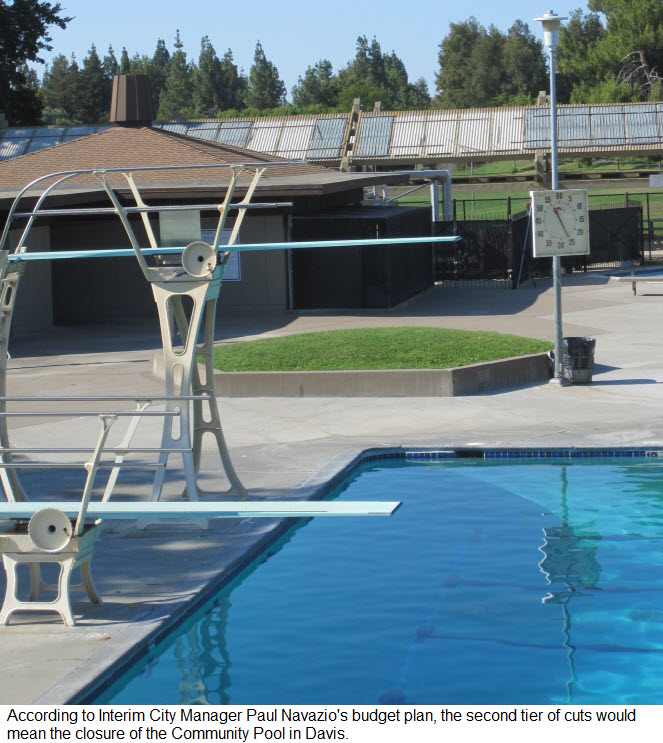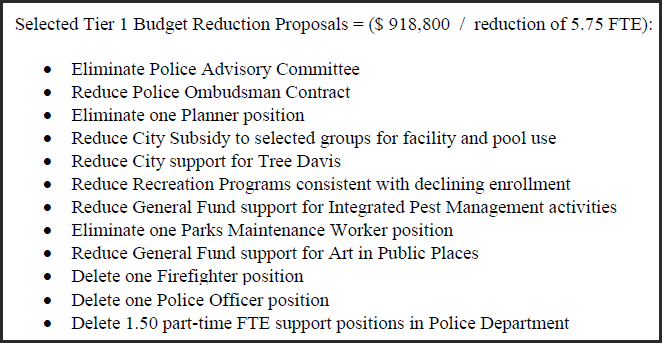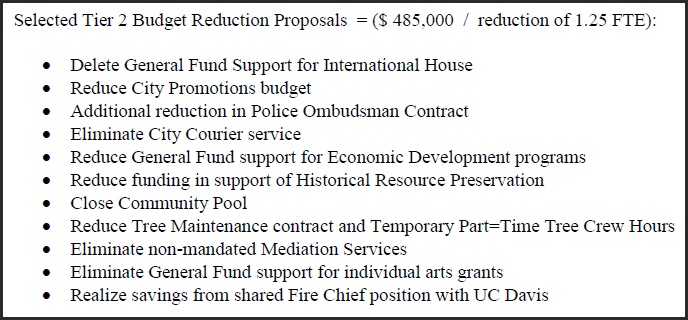 Past Council Bears Huge Responsibility For Current Mess That Will Cause Public Services to Be Slashed –
Past Council Bears Huge Responsibility For Current Mess That Will Cause Public Services to Be Slashed –
I join in that, but I have an overall mixed view of the proposals, which is a huge step up from my decidedly completely negative view previously.
I will go through the two tiers and then discuss the issue of retirement.


The first tier of budget reductions cuts about half of the money from emergency services. The city would eliminate one firefighter position. It would eliminate one police officer position, reduce the Ombudsman Contract, and delete 1.5 part-time support positions in the Police Department.
Once again, fire escapes better than police. Some of that is due to the loss of COPS (Community Oriented Policing Services) funding, and it appears there is sufficient opposition on the council to cutting police services at this point in time.
I will make a much fuller argument against these cuts and cuts to the Ombudsman over the weekend. The bottom line is that I think we need to start elsewhere before we make cuts to emergency services, particularly police.
The city should hasten the merger of the two fire departments. It would also behoove the city to begin talks about merging police services as well.


While the cuts to police are concerning, the public may react much more strongly to the closure of the Community Pool in the second tier. This is something that would rather drastically impact the lives of a group of citizens whose children, and perhaps themselves, enjoy that service.
In concept, I support the idea to find nearly half a million in budgetary savings that would be reallocated in support of needed street maintenance, as well as city facility and parks infrastructure rehabilitation and replacement needs. I have been calling for the city to invest in infrastructure and street maintenance for several years now.
However, I am concerned that once again they would rely on additional cuts to the police ombudsman contract, which I think is a total of $60,000 if not less at this point. They can certainly find $20,000 in savings elsewhere and I will again argue over the weekend that the position actually saves the city money in the short-term and particularly in the long run.
Leaving aside the issue of the Ombudsman, there are two things that needed to be done here. First, we need to start putting general fund money in to keep our roads in good repair. That is as much of a public safety issue as police and fire. Moreover, those costs will only go up as maintenance is deferred.
More importantly, we need to start making this crisis real to the public. That sounds cruel. But in the last three years we have cut millions from the budget without affecting people much at all, unless they came to a city office at certain times and found it closed.
The council expressed the need and desire to bring the community into this discussion, but unless these cuts are real for them, most of the public gets numbed by numbers and talk of budget cuts. But close their pool, close their park, brown their greenbelt, and suddenly people are engaged.
The other positive I would take from Tuesday is that the council is committed to making the kinds of changes that we need to make.
Nevertheless, there are a lot of real concerns about the budget, aside from the logistics of where to cut.
Paul Navazio took the view that the conversation about the issues of pensions and retiree medical needs to initially take place with employee bargaining group. I disagree. I think the council needs to set its policies about where these issues go, and then the city can iron out the details with the bargaining groups.
The budget really does not start to address key issues of pensions and retiree medical. Moreover, it takes an overly rosy assumption into the future. First, as Sue Greenwald pointed out, the budget assumes flat salaries for city employees for the next five years. How realistic is that?
Second, the budget assumes a flat ARR (assumed rate of return) at 7.75%. But despite PERS trying to hold the line at 7.75%, we know that number is going to fall, the only question is how low.
As Mr. Navazio confessed, “it turns into millions of dollars very quickly” when the ARR is reduced even by a quarter of a percentage.
We are talking about, with a slight lowering of the ARR, the city needing to spend $7 million more in three years on pensions and retirement health than we did last year. That is with about a $37 million dollar general fund. As it is, we are moving from 3% of our general fund budget going to retirement to 12% today to 19% in three years, even without lowering the ARR.
We could be looking at 25 to 33 percent of our budget going to people who are not presently working.
Maybe that does not bring it home for people. But put it this way, that is all money that will not be going to provide services to people. That will be money taken out of the ability to provide services.
That is the problem with this budget and the dilemma faced by the council and the city. On the one hand, you need to get the public engaged and the only way that will happen is if vital services are cut. On the other hand, the real problem is that we have simply been too generous with our compensation package to employees and there is nothing in this budget that will change that.
As Sue Greenwald noted, the chickens are coming home to roost and right now it looks like the city plans to balance the budget by providing less police protection and fewer community services to the public.
We need to remember why that is. That is in part because the last council could not make the tough decisions involving the MOUs and the city manager failed to rein in salaries and compensation. We are now about to pay for those mistakes.
—David M. Greenwald reporting

[quote]As Sue Greenwald noted, the chickens are coming home to roost and right now it looks like the city plans to balance the budget by providing less police protection and fewer community services to the public.
We need to remember why that is. That is in part because the last council could not make the tough decisions involving the MOUs and the city manager failed to rein in salaries and compensation. We are now about to pay for those mistakes.
[/quote]
Amen! I do agree with the point that the city needs to grapple with unfunded liabilities far ahead of hammering out MOUs. The city has to be determined to get all city employees/unions to make stiff concessions this time around, or city employees will be out of work and out of luck.
Why are we funding International House?
[quote]Why are we funding International House? [/quote]
Good question!
I could not believe it when I saw that Newport Beach, CA pays its manager/lifeguards over $100,000 per year. This is why CA is going broke…
Or at least why local communities are…